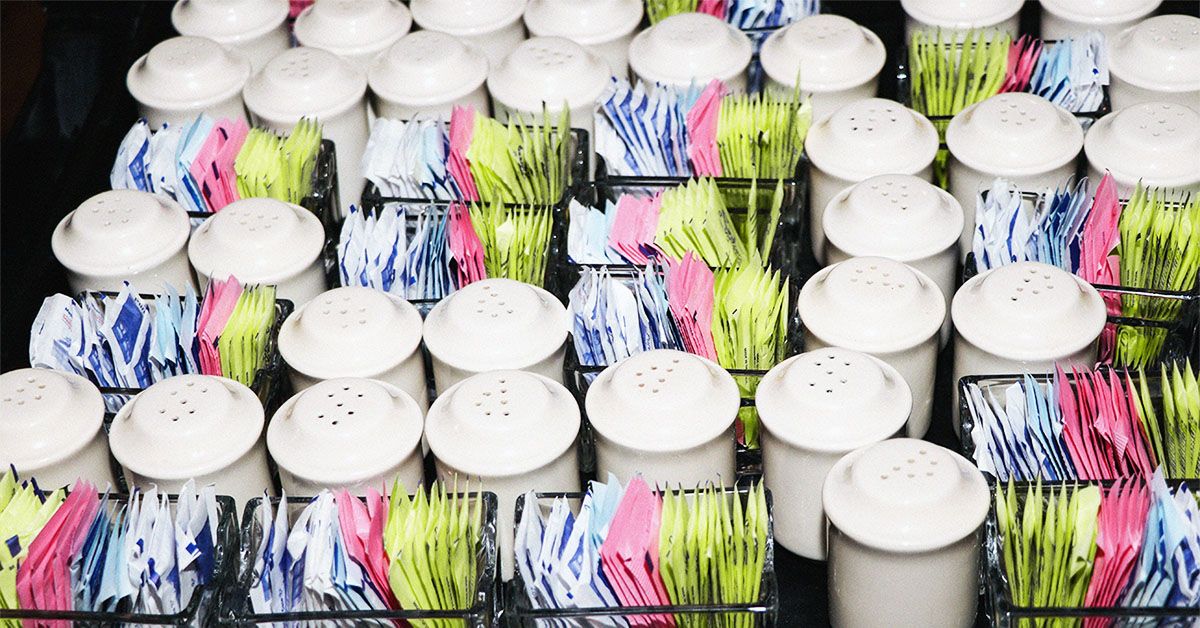- The artificial sweetener neotame damages healthy cells in the human intestinal tract, leading to serious health problems such as irritable bowel syndrome, according to a new U.K. study.
- Neotame is a sweetener formulated to be an ingredient in baked goods, various other food products, and as a tabletop flavoring.
- The study will result in fresh risk/benefit considerations of neotame as a sweetener that can help people avoid overweight and obesity, themselves drivers of multiple chronic conditions.
Neotame, an artificial sweetener available for use in food products for which aspartame is inappropriate, may damage the intestine, according to a new study from Anglia Ruskin University in Cambridge, U.K.
The study finds that neotame can alter healthy cells in human intestinal walls. This can impact the integrity of the gut wall, potentially leading to
The U.S. Food and Drug Administration approved neotame for human consumption in 2002.
It is approved in many countries as a flavor enhancer and sweetener in cakes and other confectionary foods. It is also found in some sugar-free gums, lozenges, and beverages. Neotame may be introduced into foods in manufacturing or as a tabletop seasoning.
Neotame is
The study says the sweetener can directly damage epithelial cells in the intestinal wall as well as adversely affect bacteria in the gut.
The study was conducted in vivo with E. Coli (Escherichia coli) and E. faecalis (Enterococcus faecalis), in which researchers observed various pathogenic responses after exposure to neotame.
Among these was the production of biofilm, and an increase in the ability of damaged bacteria to cling to the intestinal walls.
The study is published in Frontiers in Nutrition.
“Our studies indicate that neotame causes an increase in stress signaling in our human cells which reduces the amount of junctions that hold our cells together in a tight barrier,” Havovi Chichger, PhD, BSC, associate professor in biomedical science at Anglia Ruskin University, told Medical News Today. She is co-author of the new study, along with Aparna Shil, PhD, AFHEA, of Jahangirnagar University in Bangladesh.
“This weakens the strength of the barrier, causing more leak of materials from the gut into our blood,” Chichger explained.
She noted that biofilms caused by neotame are “linked to a range of potential issues including heightened stress response and increased resistance to antibiotics.”
Various artificial sweeteners are many times as sweet as sugars found in nature. This is so that smaller amounts of them suffice to sweeten a food product and add fewer calories.
Chichger agreed with this concept in principle, saying, “As the public moves away from a sugary diet because obesity and diabetes are increasing, artificial sweeteners have the potential to be a useful tool in improving both these conditions.”
Dietitian Kristin Kirkpatrick, MS, RDN, who was not involved in the study, agreed, saying, “When it comes to blood sugar control, artificial sweeteners always outperform sugar. I’ve witnessed this repeatedly in my patients.”
“Neotame was developed as an alternate to aspartame with the aim of being a more stable and sweet version of the traditional sweetener. It is very stable at high temperatures, which means it is particularly suited to adding to baked goods. These features make it more useful for food manufacturing,” said Chichger.
At the same time, Chichger pointed out, “The issue with these ultra-sweet chemicals is that we don’t know enough about how they act on certain environments in our body.”
Kirkpatrick said she hasn’t seen much neotame in foods consumed by her patients. She tends to see “more
The hard truth is that a sweet tooth — regardless of whether it is satisfied by natural or artificial sweeteners — may lead one to consume too much sugar. This can lead to weight gain, and can cause type 2 diabetes. Being overweight also increases one’s risk of heart disease and some cancers.
According to Kirkpatrick, “Most of the research has found that stevia, monkfruit, and sucralose are not harmful. Though some studies do indicate potential adverse effects. It’s crucial to consider the body of evidence from which a study is derived.”
She pointed out that studies may find a correlation between consumption of a sweetener and health issues, but not a causal link.
“It is interesting that when you look at randomized controlled trials, people who use low- or no-calorie foods containing artificial sweeteners to replace sugary, calorically dense foods lose weight,” Kirkpatrick said.
Her real-world experience is not quite the same, though.
“I have observed in my patients over the course of 20 years — the real world, not a study — that many of them will consume foods containing artificial sweeteners in addition to their regular food. For instance, a patient I work with enjoys cheeseburgers and fries, but often pairs the meal with a diet cola,” Kirkpatrick shared.
“If we go back to the studies,” she said, “this example of confounding could often lead to incorrect conclusions when looking at population studies versus randomized controlled trials.”
“The more data we have, the more power we have in our day-to-day lifestyle habits, including food choices. More data is always a great first step — and I’d love to see more RCTs on this topic,” Kirkpatrick added.
“There are numerous variables involved in determining safety for an individual, so for my patients, I encourage them to not label an artificial sweetener as ‘bad.’ Instead, let’s examine all the variables of the patient, as well as the strength of the study they may be citing. The [overall] dietary pattern is the most important variable in my practice — it’s way more than just a single ingredient.”
— Kristin Kirkpatrick, MS, RDN
Read the full article here











